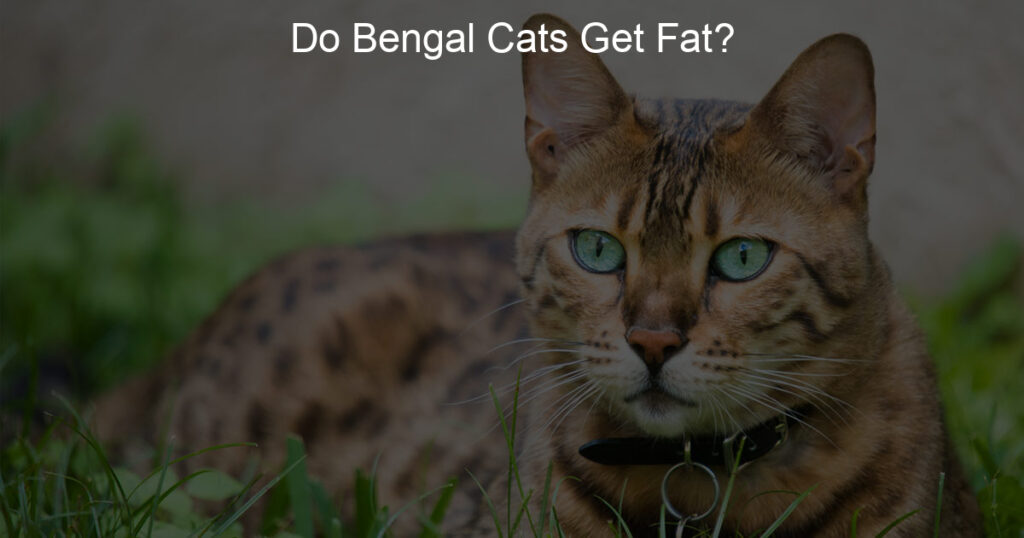Do Bengal cats get fat? It’s a question many cat lovers have, especially those with Bengal cats. After all, Bengals are known for their love of food and their big appetites. But don’t worry – your Bengal cat can indulge without getting fat. Here’s what you need to know about keeping your Bengal at a healthy weight.
How do I know if my Bengal is overweight?
Knowing if your Bengal is overweight can be tricky. Bengals are known to have heavy muscle mass and a large frame; they do not always conform to the size of most cats. The best way to determine their weight is by feeling – run your hands lightly over your cat, noting any areas where you may feel fat deposits.
Additionally, when looking at your cat from above, you should see an hourglass shape with a slight inward tuck in the front of the hips. Any outward curve along the sides may be an indication that your cat has become too chubby. While it’s important for all cats to consume healthy meals and get regular exercise for optimal health, Bengals are particularly prone to obesity due to their size and muscular nature
Are Bengal cats supposed to be skinny?
Bengal cats are usually considered to be slim or even petite, but they shouldn’t necessarily look overly thin. A healthy Bengal cat should maintain a slender, athletic physique with strong muscles and a smooth appearance. If your cat appears to be too skinny or noticeably losing weight, it could mean they don’t have enough energy to maintain its muscle mass or that its diet is lacking in essential nutrients.
It’s important to make sure that your Bengal cat has access to a food formulated specifically for them and nutritious snacks throughout the day, as well as plenty of water. If your Bengal cat does lose weight rapidly or looks especially bony, visit a vet for a complete check-up so you can determine if there’s an underlying issue causing the weight loss.
What is a healthy weight for a Bengal cat?
An average healthy weight for an adult Bengal cat is between 8 and 15 pounds. However, this range can differ slightly depending on the sex of the cat. Female Bengal cats tend to weigh a bit less than their male counterparts.
The size and weight of a Bengal cat also depend on how much food they are eating, its exercise routine, and its overall age and health. If your feline falls outside the average range, it’s best to visit a vet to ensure it’s getting appropriate nutrition and help with any potential health issues.
Do Bengal cats get bigger than normal cats?
Bengal cats may look exotic and powerful, but the truth is they are actually quite small compared to normal cats. While their muscularity and markings can give an illusion of greater size, Bengals rarely get significantly bigger in length than other domestic cats.
On average, an adult Bengal will have a body that spans between 10-14 inches with an 8-10 inch tail, which is slightly less than your standard house cat. In terms of weight though, they tend to be on the heavier side due to their broad shoulders and thicker coats. All in all, Bengals will remain petite when compared to more typical breeds.
Are Bengal cats lazy?
Bengal cats may be known for their stunning, leopard-like coat, but many people wonder if these cats are more style than substance and are content to sleep most of the day away. While it’s true that Bengals do spend a good amount of time napping, this is mainly due to their energy level: like big cats in the wild, when they’re awake, they have an abundance of energy to expend.
A Bengal’s daily routine should include playtime and mental stimulation such as interactive cat toys so they can be healthy, happy cats. If your Bengal has been wrapped up in its fur coat all day long, don’t despair – give them a little attention and watch its wilder side come alive!
Why do Bengal cats lick you?
Bengal cats are known for their affectionate and friendly nature, often reaching out to cuddle with their owners or lick them. This licking is not a sign of aggression or territorial dominance, but instead is a way for them to show how much they care for you. They lick you as a form of recognition and to mark you as part of their pack.
Furthermore, Bengal cats have sensitive tongues that seek out the natural salty oils on the skin which stimulates them with the same scents and tastes they experience while hunting in the wild. Licking also helps to bond with their owners which can help build trust and create a deeper connection between cats and humans. As such, when your Bengal cat licks you it is simply expressing its deep love and friendship toward you.
It’s a wrap
All in all, it is clear that Bengal cats have a predisposition to becoming overweight if their diet and activity levels are not carefully monitored. Although they are naturally active and therefore may be less prone to weight gain, they can still get fat if they are overfed or do not receive adequate exercise. Fortunately, most Bengal cat owners will develop healthy habits for their felines by feeding them regularly with proper balanced nutrition and providing ample opportunities for daily physical activities.
Additionally, regular check-ups with the vet should be scheduled so that any possible weight-related issues can be addressed promptly. As an owner of one of these amazing cats, you can help your pet remain healthy and happy by taking the necessary steps to prevent obesity before it has a chance to take effect. With the right care, your beautiful Bengal cat can keep its slim physique for many years to come.














